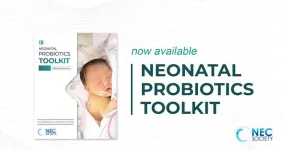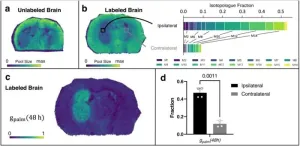(Press-News.org) Adolescents who show signs of alcohol dependence are more likely to develop depression by their mid-20s, according to a new study led by UCL (University College London) and University of Bristol researchers.
Drinking large amounts of alcohol regularly, but with no signs of dependency, did not predict depression risk, according to the findings published in The Lancet Psychiatry.
Co-lead author Dr Gemma Lewis (UCL Psychiatry) said: “By using a large, longitudinal dataset, we have found evidence that problematic drinking patterns in late adolescence may increase the risk of developing depression years later.
“Problematic drinking patterns could be a warning sign of future mental health problems, so helping young people to avoid problematic alcohol use could have long-term benefits to their mental health.”
The study involved 3,902 people who are part of the Children of the 90s birth cohort study (Avon Longitudinal Study of Parents and Children – ALSPAC), a longitudinal cohort of parents and their children born in the southwest of England in 1991 and 1992, who have been surveyed at regular intervals.
This paper looked at the association between alcohol consumption and signs of problematic drinking, or dependence, at age 18, and depression six years later at age 24.
Alcohol dependence signs include an inability to stop drinking, failure to meet normal expectations due to drinking, and feeling a need to drink after a heavy session, as well as harmful effects such as drink-related memory loss.
The researchers found that people who appeared to be dependent on alcohol at age 18 (or at any age from 17 to 22) were more likely than their peers to have depression at age 24. Those with a score of zero on the alcohol dependence scale at age 18 face an 11% probability of depression by age 24, compared to 15% for those with a score of one on the scale (an increase from zero to one on the alcohol dependency scale represents a 28% increase in the probability of not being able to stop drinking once started and a 33% increase in the probability of failing to do what was normally expected of you). This relationship remained after they adjusted for potential confounding factors such as substance use and depressive symptoms at age 16, suggesting that there may be a causal relationship between alcohol dependence and subsequent depression that is not explained by poor overall mental health in adolescence.
The researchers found that consumption levels alone were not associated with an increased risk of depression, which they say may be partly due to the fact that drinking in late adolescence is often tied with social contact and reflects social norms.
Co-lead author Dr Gemma Hammerton (University of Bristol) said: “While we found that alcohol consumption alone did not appear to increase the probability of depression, heavy drinking can be a precursor to dependence, and can have harmful physical health impacts in the longer term as well. High frequency and quantity of alcohol consumption therefore remain important as targets to prevent or reduce during adolescence.
“Public health interventions to prevent depression could target problematic alcohol use (such as if alcohol is having a negative impact on a person’s personal relationships or responsibilities), which is likely to occur before dependence, and involve high frequency and quantity of consumption.”
The study was funded by the Medical Research Council and Alcohol Research UK (now Alcohol Change UK).
Mark Leyshon, Senior Research & Policy Manager at Alcohol Change UK, said: “Alcohol consumption amongst 18 to 24-year-olds has been falling for some time. However, there remains a significant number of young people who use alcohol in a harmful way. There were over 40,000 alcohol-related hospital admissions amongst under 24s in 2019, and more than a quarter of these were for mental and behavioural disorders as a result of alcohol. The findings from this new study reinforce the importance of protecting young people from alcohol harm, through early intervention and proper funding of youth addictions services so that the right support and treatment is there for everyone who needs it.”
The findings align with the results of another recent UCL-led study in adults, which found that problematic alcohol use – but not level of consumption – is associated with increased odds of suicide attempt or self-harm.*
* UCL News, 2022: Problem drinking linked to increased risk of suicide attempt and self-harm
END
Alcohol dependency in adolescence, but not consumption, linked with later depression risk
2023-06-02
ELSE PRESS RELEASES FROM THIS DATE:
Why we need to fall out of love with flaky white fish - study
2023-06-02
The UK’s growing mismatch between the fish we catch and the fish we want to eat has clear implications for our future food security, according to new research.
Led by the University of Essex and the Centre for Environment Fisheries and Aquaculture Science (Cefas), the study, published in the international peer-reviewed journal Reviews in Fish Biology and Fisheries, for the first time offers a comprehensive, long-term analysis of how major policy changes in the past 120 years have influenced patterns in UK seafood production, trade and consumption.
It shows that even if we changed our fish-eating habits away from choosing flaky white fish such as cod ...
UK’s poorest children likelier to have less understanding of personal finances, study finds
2023-06-02
A new study of 3,745 families from across the UK demonstrates a “sizeable” gap in the financial knowledge of children depending on which socio-economic group they come from.
The research highlights significant inequalities in young people’s financial capabilities, with the results pointing toward disadvantaged children not developing key financial skills.
In findings published in the peer-reviewed British Journal of Educational Studies, an expert team from UCL are calling for a greater emphasis on developing financial skills amongst children starting at primary school, particularly aimed towards those from disadvantaged social backgrounds, with “a particular need ...
ASCO 23: Thyroid cancer precision approaches that incorporate targeted therapies and other treatments are changing the surgeon’s role
2023-06-02
DOWNLOADABLE B-ROLL/VIDEO
MIAMI, FLORIDA (June 1, 2023) – Historically, surgery was the first line of treatment for patients with thyroid cancer. Now, as targeted therapies and other new medications emerge, surgery for certain patients may become more of a secondary option if those treatments fail. This new context could potentially change how some procedures are conducted.
Otolaryngologist and head and neck surgeon Dr. Zoukaa Sargi, will join a June 2 panel discussion on thyroid cancer care ...
Medical College of Wisconsin cancer researcher & key investigator on study of Pirtobrutinib, now FDA approved for patients previously treated for Mantle Cell Lymphoma
2023-06-02
In a multicenter phase 1 and 2 trial (BRUIN, NCT03740529), researchers from leading cancer centers across the globe, including the Medical College of Wisconsin (MCW) in Milwaukee, tested Bruton tyrosine kinase inhibitor (BTKi), pirtobrutinib, in patients with pre-treated mantle cell lymphoma (MCL). Results of the study, which assessed the efficacy of the drug in a cohort of 90 patients with poor survival prognosis, demonstrated the reversible BTKi drug to be both safe and effective in achieving inhibition of defective B-cells. The results were published by the Journal of Clinical Oncology on May 16.
MCL is an aggressive, rare subtype of ...
Researchers develop new detection tool for beech leaf disease’s nematode pest
2023-06-02
Beech leaf disease is an emerging threat to North American forest ecosystems. It was first discovered in northeastern Ohio in 2012, and has already spread to 12 additional U.S. states and Canadian provinces. At first the cause of the disease was unknown, and the sick and dying trees were diagnosed on symptoms alone: Dark banding along the leaf veins and shriveled, leathery leaves. But in 2017, nematodes were found in diseased leaves, and by 2020 we had the answer: A newly recognized subspecies of the wormlike creature, Litylenchus crenatae mccannii, was definitely associated with the symptoms.
In order to monitor the spread of the disease, to understand the nemotode’s ...
St. Jude finds NLRP12 as a new drug target for infection, inflammation and hemolytic diseases
2023-06-01
(MEMPHIS, Tenn. – June 01, 2023) Infections and other diseases can cause red blood cells to rupture, releasing the oxygen-binding molecule hemoglobin, which breaks down into heme. Free heme can cause significant inflammation and organ damage, leading to morbidity and mortality. Researchers from St. Jude Children’s Research Hospital discovered NLRP12, an innate immune pattern recognition receptor, to be the key molecule responsible for inducing inflammatory cell death and pathology in response to heme combined with other cellular damage or infection. The finding provides a new potential drug target to prevent morbidity in certain illnesses. ...
Ancient viruses discovered in coral symbionts’ DNA
2023-06-01
HOUSTON – (June 1, 2023) – An international team of marine biologists has discovered the remnants of ancient RNA viruses embedded in the DNA of symbiotic organisms living inside reef-building corals.
The RNA fragments are from viruses that infected the symbionts as long ago as 160 million years. The discovery is described in an open-access study published this week in the Nature journal Communications Biology, and it could help scientists understand how corals and their partners fight off viral infections today. But it was a surprising find because most RNA viruses are not known ...
NEC Society launches neonatal probiotics toolkit
2023-06-01
Davis, CA - The Necrotizing Enterocolitis (NEC) Society is thrilled to release the Neonatal Probiotics Toolkit. The Toolkit provides structure to clinicians in neonatal intensive care units (NICUs) as they consider the complex process and decision of whether to implement probiotics to help prevent NEC. The Toolkit is not a recommendation for or against the routine use of probiotics in the NICU, nor for or against the use of any product or preparation method.
NICUs and clinicians are encouraged to use the Toolkit to foster thoughtful, intentional dialogue and inclusive conversations amongst key stakeholders in the NICU, including the need for patient-families to understand ...
Cancer cells rev up synthesis, compared with neighbors
2023-06-01
Tumors are composed of rapidly multiplying cancer cells. Understanding which biochemical processes fuel their relentless growth can provide hints at therapeutic targets.
Researchers from Washington University in St. Louis have developed a technology to study tumor growth in another dimension — literally. The scientists established a new method to watch what nutrients are used at which rates spatially throughout a tissue.
By using this multidimensional imaging approach, they identified pathways whose activities are uniquely elevated in brain cancer, offering clues for potential treatment strategies. The study was published May 19 in Nature Communications.
“We ...
Eye drops slow nearsightedness progression in kids, study finds
2023-06-01
COLUMBUS, Ohio – The results of a new clinical trial suggest that the first drug therapy to slow the progression of nearsightedness in kids could be on the horizon.
The three-year study found that a daily drop in each eye of a low dose of atropine, a drug used to dilate pupils, was better than a placebo at limiting eyeglass prescription changes and inhibiting elongation of the eye in nearsighted children aged 6 to 10.
That elongation leads to myopia, or nearsightedness, which starts in young kids and ...





